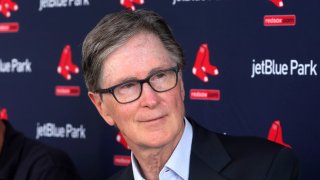
FORT MYERS, Fla. -- After listening to Red Sox ownership wax sentimental about Stan Musial, long for just one more peek at Mookie Betts' dreamy smile, and remind fans that $99 tier five family packs are available right now, so get 'em before they're gone, I found myself wishing they could've demonstrated a little more humility and candor on Monday morning.
In truth, they had little chance of satisfactorily defending a move most fans consider indefensible. But had we the opportunity to shoot up owner John Henry, chairman Tom Werner, and CEO Sam Kennedy with a little sodium pentothal, here are five things I wish they had said.
1. "This was about the CBT."
If there's a truly head-scratching aspect of the Betts trade, it's ownership's insistence that the media has someone misconstrued the organization's intentions. Even Henry's meandering opening statement, which he billed as "addressing Red Sox fans directly," suggested that reporters have somehow failed the fanbase by noting the obvious truth that the Red Sox wanted to drop the payroll below $208 million to reset their luxury tax penalties this season.
LIVE stream the Celtics all season and get the latest news and analysis on all of your teams from NBC Sports Boston by downloading the My Teams App.
There are a host of reasons to do so. It protects the team's spot in the draft, it reduces the amount it must pay for exceeding various thresholds, and it positions the club to spend again, a la the Yankees and Dodgers this winter.
Local
In-depth news coverage of the Greater Boston Area.
But nope. They're still clinging to this defiant notion that the trade was about talent and not clearing the books. OK.
2. "This was a salary dump."
I'm not sure why "salary dump" is such a dirty phrase. In moving half of David Price's remaining $96 million off the books, the Red Sox not only ditched a player who's unlikely to justify his paycheck, but they created the opportunity to replace him with someone younger, and youth is the most valuable currency in today's game.
The Yankees and Dodgers are the two highest-profile examples of big-market teams who slashed payroll in order to build around youth, and it has worked out smashingly for each. The Yankees created the flexibility to sign Gerrit Cole to the largest contract ever given a pitcher, while the Dodgers had room to absorb both Betts and Price. Each team is also coming off 100-win seasons.
Werner was asked why financial flexibility couldn't be a justifiable end in and of itself.
"It can be," he said. "But if we had simply wanted to have a salary dump, there would've been other ways to do that. It wasn't a salary dump. It was to give us flexibility. We could've moved in different directions. We could be sitting here saying Mookie is a member of our team this year. We made a strategic decision for what was in the best interests of the team this year and going forward, that this was a wise trade. We followed Chaim (Bloom's) recommendation, but there would've been other ways to have a salary dump than the path we went forward with."
Werner added it was "hypothetically" true the team could've traded Price alone, but I'm skeptical another club would've eaten half of his remaining money without Betts being attached.
3. "We've mismanaged our payroll."
When the club explained why it fired former president of baseball operations Dave Dombrowski in September, Henry noted that he knew shortly after the World Series parade that the two men did not share the same vision moving forward. Dombrowski wanted to spend, Henry wanted to cut.
So it's fair to ask why Henry allowed Dombrowski to sign pitchers Chris Sale and Nathan Eovaldi to contracts totaling more than $200 million last offseason, a question that ownership batted away.
"These decisions, there are a lot of hypotheticals here," Werner said. "We are pleased with the value we got back from the Dodgers. We might not be having this discussion, we might have preceded under different scenarios, but we are where we are based on the proposal that we agreed to."
Based on his injury-riddled 2019, Sale would not have cashed in for $145 million this winter. Based on his injury history, Eovaldi shouldn't have been signed to a $68 million contract based on two strong weeks in the playoffs.
But they were and here we are. The bloated Red Sox payroll cost them Betts as much as anything else.
4. "We've mismanaged our roster."
Band-Aids are how you end up becoming the New York Knicks. At some point, a team must be willing to take a step back, make some hard decisions, and set a course for the future. Throwing money after a top-heavy roster with zero depth might keep the Red Sox in marginally better playoff contention, but it won't address the hard truth that, with or without Betts, they're not a realistic World Series contender.
The once-strong farm system has been pillaged, the back of the roster is a mess, and there's little in the pipeline that suggests hope. The Red Sox need a reset while there's still time to build around the Xander Bogaerts-Rafael Devers-Andrew Benintendi core, but the sooner they start that process, the better.
5. "We're going to spend again."
This is a factual statement that is on the team's side, and yet no one thinks to just come out and say it. Criticize Henry and Co. all you want, but they're not shy about spending. The money they save this year will go right back into the roster, and it shouldn't surprise anyone if they boast the game's highest payroll within a year or two.
So say it! "We're only two years removed from spending more on players than any team in baseball," Henry could've said, "and I want the fans to hear this directly from me: we will spend that much again."
Instead, unfortunately, we got a bunch of sentimentality about Stan the Man, a misleading comparison to Nomar Garciaparra, and an embarrassing plea to buy student tickets for nine bucks. When it comes to getting out of their own way, Red Sox ownership always seems to end up in a heap.



